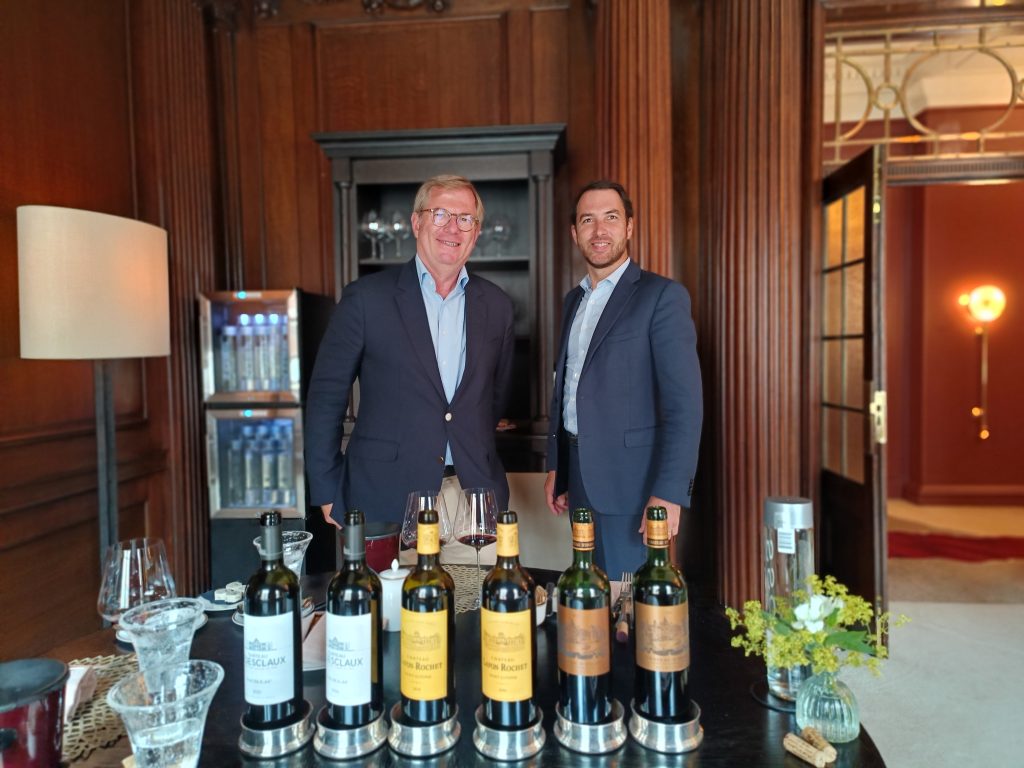このウェブサイトでは、お客様に最高のユーザー体験を提供できるよう、クッキーを使用しています。クッキーの情報は、お客様のブラウザに保存され、お客様が当ウェブサイトに再度訪問された際に、お客様を認識したり、お客様が当ウェブサイトのどのセクションを最も興味深く、有用であると感じるかを当チームが理解するのに役立つなどの機能を果たします。
The en primeur system needs to be ‘redefined and rebuilt’
The rules of en primeur need to be “redefined and rebuilt” the co-owner and MD of some of Bordeaux’ leading chateaux told the drinks business in a frank interview.

Emmanuel Cruse, director-general of Vignobles Cruse-Lorenzetti (which includes Châteaux d’Issan in Margaux, Pauillac’s Châteaux Pedesclaux, and Châteaux Lafon-Rochet and Lilian Ladouys in Saint-Estephe in its portfolio) told db at a recent tasting that this year’s en primeur campaign was “probably one of the worst campaigns we have had in thirty years – not because of the quality of the wine, but because of the economic situation.”
He argued that it was important going forward that the rules of en primeur be “redefined and rebuilt”.
“The futures [en primeur] is what Bordeaux is known for – and if you look at all those big names coming to Bordeaux to be distributed by the Bordeaux market place, it’s because it’s a very powerful system. But for the first time, this very powerful system seems to be very sick [‘flu], and we def need to redefine the system to make sure that it will be better in 2024,” he told db.
Slow down
According to Cruse, one of the biggest problems in the macroeconomic landscape is that two major markets for Bordeaux, the US and Asia, have slowed down at the same time, while Europe and the UK also remains “unsettled”.
Traditionally, while one of these markets might be down, the shortfall might be resolved by the other two. But in 2024 has seen this has come at the same time.
Cruse identified a second problem apparently undermining the system, explaining that the original idea and impact of selling Bordeaux en primeur was to “sell huge amount of wine worldwide”.
However, he argued that currently, some wineries were only putting 30% of their production onto the market, but the result of this was to create speculation around those brands. He argued that it was vital to reduce this level of speculation.
Respect
“People are not looking for speculation for great Bordeaux wines” he argued, adding that it was “important to respect the system” otherwise it would “not be interesting to the consumers”.
“We need to redefine the volumes that we put on the market ‘in future’,” he said. “Although each chateau needs to look at its own policy, an average of 70-80% is what we normally have to do.”
“The idea of ‘futures’ [ie buying en primeur] is that you need to buy a wine at the best condition possible as you’re paying three years in advance. If that’s not happening anymore, why do you need to buy ‘in future’ [en primeur]? You could buy when it’s bottled!”
Consumption also needs to change
He also noted that there were stocks of Bordeaux wines in Asia that were not being drunk.
“We need to think differently the way we need to drink wine, as if everyone wants to keep it for 20years, when are they going to drink it?” he asked.
Cruse argued that generally, people want to keep their Bordeaux wine “a little bit too long” , explaining that with the majority of consumers not having proper cellars, it was “complicated for them to keep the wines for 20 years.”
Although there were people with access to proper cellarage, which would allow them to keep the wines until the optimum age, around 80% of consumers saw wine as an instant pleasure, to be enjoyed with friends.
2016
He argued, for example that the 2016 vintage Bordeaux was already ready for drinking – particularly if it is decanted for a few hours.
He said: “I am not sure that opele would like to keep their wine now for 20-30 years, as was done in the past.
“Consumers always ask us, ‘how long should we keep the wine?’ but it depends on the way that you like your wine. If you like to drink it young, feel free to do so!”
He also argued that the way that Bordeaux producers were picking, vinifying, ageing and blending wines now, meant that wines were increasingly gaining precision and were suitable for drinking younger – “without forgetting their ability to age as well”.
“Wine has gained in precious so it is ready to be drunk younger although they do have the capability to age,” he continued, “for example, the 2016 and the 2020 have a huge life, but at the same time, the freshness of the vintage would definitely bring young drinkability as well.
“The ways that the wines are made nowadays, they are made for earlier consumption, but you can keep them for years if you want to.
“That is the magic of Bordeaux, that sometimes some vintages are a little bit shy at the beginning – that was the case for 2014 for example, but after 10 or 15 years, they are showing beautifully, and very authentically Bordeaux.”
UK merchants
On a brighter note, he noted that some of the UK merchants had reported a successful campaign for the company’s wines, which saw the price drop by more than a quarter (-26% for Châteaux Pedesclaux and 27.1% for Châteaux d’Issan – although Châteaux Lafon-Rochet dropped it price less, by only 19.1%).
“The vintage 2023 was extremely good and I think the price was really fair as it was down 30% down on previous vintages compared to average vintages,” he noted.
“So you have everything for the private consumers – it’s a wonderful vintage to buy as it’s a real good deal.”

